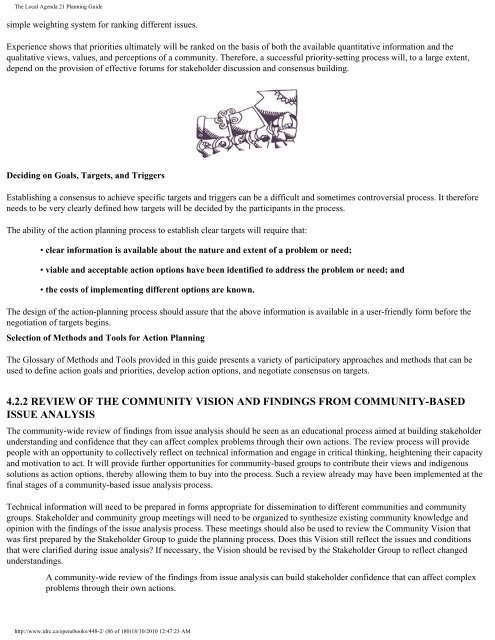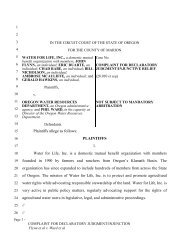The Local Agenda 21 Planning Guide - Democrats Against UN ...
The Local Agenda 21 Planning Guide - Democrats Against UN ...
The Local Agenda 21 Planning Guide - Democrats Against UN ...
Create successful ePaper yourself
Turn your PDF publications into a flip-book with our unique Google optimized e-Paper software.
<strong>The</strong> <strong>Local</strong> <strong>Agenda</strong> <strong>21</strong> <strong>Planning</strong> <strong>Guide</strong><br />
simple weighting system for ranking different issues.<br />
Experience shows that priorities ultimately will be ranked on the basis of both the available quantitative information and the<br />
qualitative views, values, and perceptions of a community. <strong>The</strong>refore, a successful priority-setting process will, to a large extent,<br />
depend on the provision of effective forums for stakeholder discussion and consensus building.<br />
Deciding on Goals, Targets, and Triggers<br />
Establishing a consensus to achieve specific targets and triggers can be a difficult and sometimes controversial process. It therefore<br />
needs to be very clearly defined how targets will be decided by the participants in the process.<br />
<strong>The</strong> ability of the action planning process to establish clear targets will require that:<br />
• clear information is available about the nature and extent of a problem or need;<br />
• viable and acceptable action options have been identified to address the problem or need; and<br />
• the costs of implementing different options are known.<br />
<strong>The</strong> design of the action-planning process should assure that the above information is available in a user-friendly form before the<br />
negotiation of targets begins.<br />
Selection of Methods and Tools for Action <strong>Planning</strong><br />
<strong>The</strong> Glossary of Methods and Tools provided in this guide presents a variety of participatory approaches and methods that can be<br />
used to define action goals and priorities, develop action options, and negotiate consensus on targets.<br />
4.2.2 REVIEW OF THE COMM<strong>UN</strong>ITY VISION AND FINDINGS FROM COMM<strong>UN</strong>ITY-BASED<br />
ISSUE ANALYSIS<br />
<strong>The</strong> community-wide review of findings from issue analysis should be seen as an educational process aimed at building stakeholder<br />
understanding and confidence that they can affect complex problems through their own actions. <strong>The</strong> review process will provide<br />
people with an opportunity to collectively reflect on technical information and engage in critical thinking, heightening their capacity<br />
and motivation to act. It will provide further opportunities for community-based groups to contribute their views and indigenous<br />
solutions as action options, thereby allowing them to buy into the process. Such a review already may have been implemented at the<br />
final stages of a community-based issue analysis process.<br />
Technical information will need to be prepared in forms appropriate for dissemination to different communities and community<br />
groups. Stakeholder and community group meetings will need to be organized to synthesize existing community knowledge and<br />
opinion with the findings of the issue analysis process. <strong>The</strong>se meetings should also be used to review the Community Vision that<br />
was first prepared by the Stakeholder Group to guide the planning process. Does this Vision still reflect the issues and conditions<br />
that were clarified during issue analysis? If necessary, the Vision should be revised by the Stakeholder Group to reflect changed<br />
understandings.<br />
A community-wide review of the findings from issue analysis can build stakeholder confidence that can affect complex<br />
problems through their own actions.<br />
http://www.idrc.ca/openebooks/448-2/ (86 of 180)18/10/2010 12:47:23 AM










